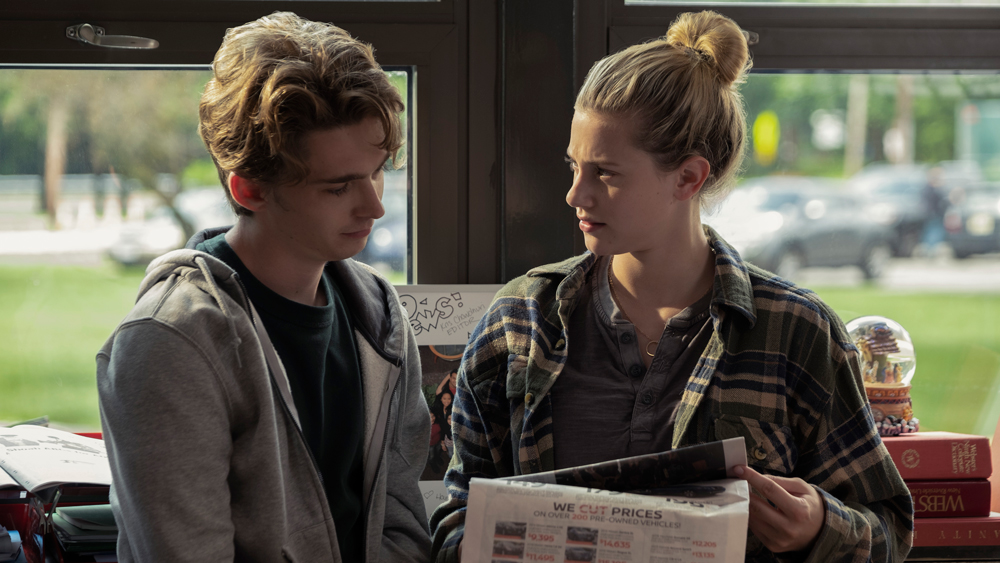What to Watch Verdict
This romantic hook is sufficiently sharp, even if Lili Reinhart needs to carry 'Chemical Hearts' on her back to sharpen it.
Pros
- +
♥️Great character work from Lili Reinhart.
- +
♥️Interesting exploration of whether relationships can heal trauma.
Cons
- -
♥️Austin Abrams just can't make his character interesting.
- -
♥️Feels like a melodrama trapped in a mumblecore.
- -
♥️Boring to look at.
Chemical Hearts aims right for a level of banal watchability that seems purposely designed to deflect criticism or insight. On a nuts and bolts level, the film is… fine, I guess. If that seems like a weak recommendation, that’s just the kind of emphatic shrug this film encourages with ninety-three minutes of passable performances, low stakes storytelling, and muted romantic energy. Is this going to scratch someone’s itch for a young adult romance story? Probably. Is it going to wind up being remembered even a week after it was watched? Almost certainly not.
Based on Krystal Sutherland’s novel Our Chemical Hearts, the film follows the novel’s narrative beats while streamlining for time and convenience. Henry Page (Austin Abrams) is a high school senior excited to finally be appointed to the editor position of his school paper, only to find that he has been made co-editor with transfer student Grace Town (Lili Reinhart). Strangely enough, Grace is initially uninterested in the position, despite having a reputation as a prodigious writer in her own right. Henry opts to walk home with Grace from school, who uses a cane for support and chooses to walk despite owning a car. It immediately becomes clear that there’s more to Grace than her sullen nature first lets on, and Henry becomes enraptured with finding out what exactly makes Grace tick.
"Enraptured" may be too strong of a word, though, for how Abrams portrays Henry with about as much personality and range as a dried-out sponge. To Abrams’ credit, part of this is written into the character, who has been stripped of most of his character arc from the book in favor of acting as an audience surrogate for Grace’s journey. There are hints of that personality littered throughout the screenplay, such as Henry’s fascination with reconstructing broken pottery in a heavy-handed metaphor for his desire to fix “broken” people, but the film highlights those signifiers before quickly abandoning them, as if the film was written with only a Cliff’s Notes version of the novel for reference. And while there are occasionally deadpan funny scenes that play off of Abrams’ awkward naturalism, he just isn’t well equipped to deal with the film’s confused tone.
That’s because even though Chemical Hearts is written with the necessary melodramatics of a teenage romance, with sweeping odes to feelings being too large to handle, the film is directed like a subdued mumblecore indie, a perplexing tonal mismatch considering that Richard Tanne is directing his own screenplay. The only person who seems fully aware of what balance to strike is Reinhart, who pushes Grace from withdrawn to expressive in ways that feel consistent within the restrictive confines of the film’s established mood. The film’s lean into Grace’s tragic backstory may do a disservice to Henry’s function as a character, but it does make the film an interesting character study in how a budding romantic relationship can and cannot help us recover from our traumas.
Breaking down that arc would take away from one of the only narrative pleasures Chemical Hearts has left, since what remains is largely a teenage flirtation that develops slowly and without much incident until plot decides to rear its ugly head. It certainly doesn’t help that the film’s desaturated color palette lends everything a sleepy, muted feel, with flat cinematography that forces the acting to do most of the visual storytelling. To be clear, this isn’t exactly a bad choice, even if the comfortable mood is in stark contrast to the extremity of the drama that eventually unfolds, but it does fail to make the film stand out in any appreciable way. That is, except for a hilariously absurd bit of set design in Henry’s bedroom, which is so committed to the color blue that every single book on Henry’s shelf is the exact same shade.
To call Chemical Hearts a bad film would be a disservice to the benign core competencies that make it work. It has a functional screenplay, if a bit lopsided and blatant about what parts of the novel it considered vestigial. It’s shot and directed capably, even if it looks like an episode of mid-2000s TV without any aspirations toward standing out. The romantic hook is sufficiently sharp, even if Lili Reinhart needs to carry Austin Abrams on her back to sharpen it. For all that I could break down what doesn’t work about Chemical Hearts, the boring conclusion here is that it’s just fine. I’ll leave it up to you whether “just fine” means “good enough.”
Chemical Hearts will be available on Amazon Prime on August 21, 2020.
The latest updates, reviews and unmissable series to watch and more!
Leigh Monson has been a professional film critic and writer for six years, with bylines at Birth.Movies.Death., SlashFilm and Polygon. Attorney by day, cinephile by night and delicious snack by mid-afternoon, Leigh loves queer cinema and deconstructing genre tropes. If you like insights into recent films and love stupid puns, you can follow them on Twitter.


